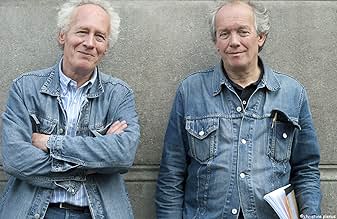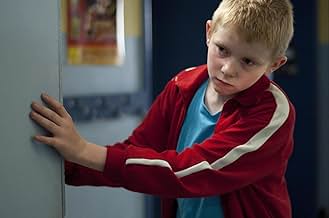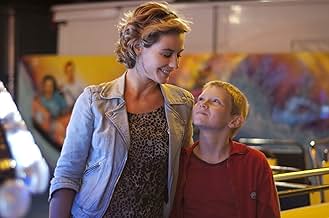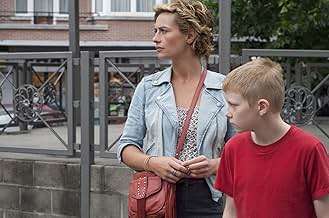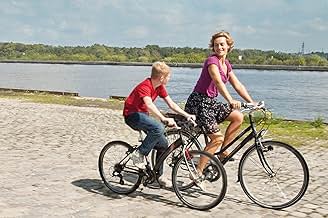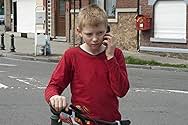CALIFICACIÓN DE IMDb
7.4/10
29 k
TU CALIFICACIÓN
Abandonado por su padre, un niño se queda en una granja juvenil estatal. En un acto de bondad, el peluquero de la ciudad acepta acogerlo los fines de semana.Abandonado por su padre, un niño se queda en una granja juvenil estatal. En un acto de bondad, el peluquero de la ciudad acepta acogerlo los fines de semana.Abandonado por su padre, un niño se queda en una granja juvenil estatal. En un acto de bondad, el peluquero de la ciudad acepta acogerlo los fines de semana.
- Dirección
- Guionistas
- Elenco
- Premios
- 9 premios ganados y 31 nominaciones en total
Cécile de France
- Samantha
- (as Cécile De France)
Samuel De Ryck
- Éducateur 2
- (as Samuel De Rijk)
- Dirección
- Guionistas
- Todo el elenco y el equipo
- Producción, taquilla y más en IMDbPro
Opiniones destacadas
what a great movie! this is also a living proof that how great the french people could make an ordinary story become a profound masterpiece. this is a movie with almost all good ingredients put together in such seamless texture: great screenplay, great cast, great actors, great director.... what an emotional ride, so profound and so engaging. now i know why France would have so many great writers and artists. this a near perfect motion picture. the kid, his biologic irresponsible father, a loving and care hair dresser, a cunning drug dealer, the french social workers, the victimized father and son later both turned out to be not as honest and sincere as the kid. if there's any award that is specialized just for an underage young actor, the kid who played the kid in this movie should get it.
Greetings again from the darkness. When Guy (Jeremie Renier) states that he can't take care of his son Cyril (Thomas Douret) right now, I felt a rush of anger and disgust. Imagine if you were his 11 year old son hearing those words. Young kids should be able to count on their parents for emotional security above all else. There should be no fear of abandonment ... those are issues no child should be forced to deal with (barring a natural disaster).
The Belgium writer/director team of brothers Jean-Pierre and Luc Dardenne have a history of taking on parenthood and childhood in a head-on manner. Cyril is dumped in an orphanage by his dad, and is convinced that he is just misplaced, not abandoned. So being the fiercely determined kid he is, he re-traces his steps from coffee shops to bars to their old apartment. Cyril is convinced his dad never would have sold his treasured bicycle, no matter how desperate for money he was.
Whatever confusion and hostility that you think Cyril might experience, once he confronts his dad, the filmmakers display it in the rawest possible form. Cyril is a symbol of need, hiding behind a wall of rebellion. A chance encounter with Samantha (Cecile de France) leads to weekend visitations and the start of an awkward quasi-family life for both of them. Cyril tests Samantha and all other authority figures in every possible manner, often to the breaking point.
As a parent, it's easy to spot the vulnerabilities that a child faces before they have the maturity to handle it. We see how easily Cyril falls in with the wrong crowd and how quickly things can get really bad. Luckily for Cyril, Samantha doesn't abandon him. She answers "I don't know" to his question of why she let him stay with her. Although, the filmmakers never let us in on her deepest thoughts, we suspect she was once not all so different than Cyril, and someone stepped up for her.
This film won the Grand Jury Prize at Cannes in 2011 and it's easy to see how. It shows how difficult and messy ordinary life can be, but how often things turn out OK, though rarely perfect. Film lovers will recognize Cecile de France from her many films, including the recent Hereafter and the excellent Mesrine.
The Belgium writer/director team of brothers Jean-Pierre and Luc Dardenne have a history of taking on parenthood and childhood in a head-on manner. Cyril is dumped in an orphanage by his dad, and is convinced that he is just misplaced, not abandoned. So being the fiercely determined kid he is, he re-traces his steps from coffee shops to bars to their old apartment. Cyril is convinced his dad never would have sold his treasured bicycle, no matter how desperate for money he was.
Whatever confusion and hostility that you think Cyril might experience, once he confronts his dad, the filmmakers display it in the rawest possible form. Cyril is a symbol of need, hiding behind a wall of rebellion. A chance encounter with Samantha (Cecile de France) leads to weekend visitations and the start of an awkward quasi-family life for both of them. Cyril tests Samantha and all other authority figures in every possible manner, often to the breaking point.
As a parent, it's easy to spot the vulnerabilities that a child faces before they have the maturity to handle it. We see how easily Cyril falls in with the wrong crowd and how quickly things can get really bad. Luckily for Cyril, Samantha doesn't abandon him. She answers "I don't know" to his question of why she let him stay with her. Although, the filmmakers never let us in on her deepest thoughts, we suspect she was once not all so different than Cyril, and someone stepped up for her.
This film won the Grand Jury Prize at Cannes in 2011 and it's easy to see how. It shows how difficult and messy ordinary life can be, but how often things turn out OK, though rarely perfect. Film lovers will recognize Cecile de France from her many films, including the recent Hereafter and the excellent Mesrine.
This film takes place in Europe (Belgium, apparently) so it has far less of the violence that would accompany the same story set in America. But otherwise the story is particularly painful to watch because the essential elements - a kid without a father, his self-hate and anger, the substitute father figures laying in wait - are directly relevant to the American context. In a lean, tough story, the film takes us through a broad tour of the issues and risks and even reasons for hope in these situations. Young Thomas Doret fiercely embodies the aching and the rage of a boy who wants a father at any price and is a near-force of nature in trying to obtain what should be his by right. Cécile De France's Samantha has numerous real-life counter-parts, credited by more than one survivor of these dilemmas, but not always successful in their roles as passionate rescuers. How this particular story turns out is not so important as the realization that all across the world children live in Cyril's situation; some make it, many don't.
The Dardenne brothers (L'Enfant, Lorna's Silence) once again demonstrate their mastery for crafting character studies around broken souls trying to get by in France, with their newest film, The Kid With A Bike. The film opens with young Cyril Catoul (Thomas Doret), trying to break free from an orphanage to see his father, while everyone around him is trying to explain that his father has left him there. It's a heartbreaking opening, immediately giving us a taste of the magnificent performance that Doret will continue to demonstrate over the course of the film. Cyril is desperate to escape their clutches and refuses to listen to their pleas for understanding. He's a rebellious young boy, unyielding in his cause and so sure that there must be some explanation; surely his father couldn't be that cruel. Of course the audience knows the revelation he is most likely going to receive.
Soon he comes into the care of Samantha (the always great Cecile De France), a hairdresser in the town nearby who runs into him by chance, and this is where the film really starts to succeed. The relationship at the core of the film isn't with Cyril and his father (whom we do eventually meet), but instead with him and Samantha. Cyril spends his time pouting, rebelling and generally being your standard adolescent boy, while Samantha tries to become this mother never had. Cecile De France is an actress I'm always interested to watch, with her expressive face that she's put to great use in many films before this but never so well as she does here. Samantha's resilience towards Cyril's constant attempts to pull away make it clear that she must have come from a situation similar to his, and is fighting so fiercely to make sure he doesn't face the fate that she knows exists. In a town filled with troubled youths, Samantha fought her way out the other side and she wants to bring Cyril there with her. It's a very warming dynamic and the Dardennes really make you feel all of the highs and lows of it. This isn't your standard character study; you feel these characters like very few films can make you do.
One of the most sensational aspects of the picture is the performance anchoring it all from Thomas Doret. Watching Doret, I couldn't help but be reminded of the young Jean-Pierre Leaud in The 400 Blows. Cyril is a rebel in the purest form, broke down by the society he's been born into and constantly fighting back against the authority figures in his life. But unlike Leaud's Antoine Doinel, Cyril isn't looking for freedom here; he's looking for acceptance. Throughout the film Cyril is pulled in a multitude of directions, but the only one he wants to get pulled into is the arms of his father; and in the twisted harshness of life, that's the one direction that just pushes him away. Doret completely embodies this character, absent of any tick or fallacy that generally comes with a child actor. It's got to be the finest child performance put on screen in quite some time. The boy isn't some adorable little kid; he's a real person and sometimes he drives you insane, but you always end up rooting for him when it comes down to it. My heart sank in the moments with his father (played well by Dardennes regular Jeremie Renier), warmed in the few bright spots in his life and when he was in danger I almost drew blood from digging my nails into my palm due to the tension.
Along with the emotional journey that the Cyril/Samantha dynamic takes you on, the Dardennes also imbue the film with a dark fairy tale metaphor that I found added a great new layer to Cyril's story. Cyril spends the film wearing a variety of red tops, clearly representing our Riding Hood lost in the woods, and at a certain point he encounters our version of the Big Bad Wolf; a troubled youth who didn't have the luxury of a Samantha in his life. This Wolf is the counter to Samantha's mother figure and Cyril is a broken soul caught in a world where he could walk down the dark path of the drug dealers and thieves or into the light that Samantha tries to open up to him. It's a strikingly human story that keeps you on your toes and grasps your heart. I won't reveal the final path that Cyril ends up taking, but it kept me in tears for the final ten or fifteen minutes.
Soon he comes into the care of Samantha (the always great Cecile De France), a hairdresser in the town nearby who runs into him by chance, and this is where the film really starts to succeed. The relationship at the core of the film isn't with Cyril and his father (whom we do eventually meet), but instead with him and Samantha. Cyril spends his time pouting, rebelling and generally being your standard adolescent boy, while Samantha tries to become this mother never had. Cecile De France is an actress I'm always interested to watch, with her expressive face that she's put to great use in many films before this but never so well as she does here. Samantha's resilience towards Cyril's constant attempts to pull away make it clear that she must have come from a situation similar to his, and is fighting so fiercely to make sure he doesn't face the fate that she knows exists. In a town filled with troubled youths, Samantha fought her way out the other side and she wants to bring Cyril there with her. It's a very warming dynamic and the Dardennes really make you feel all of the highs and lows of it. This isn't your standard character study; you feel these characters like very few films can make you do.
One of the most sensational aspects of the picture is the performance anchoring it all from Thomas Doret. Watching Doret, I couldn't help but be reminded of the young Jean-Pierre Leaud in The 400 Blows. Cyril is a rebel in the purest form, broke down by the society he's been born into and constantly fighting back against the authority figures in his life. But unlike Leaud's Antoine Doinel, Cyril isn't looking for freedom here; he's looking for acceptance. Throughout the film Cyril is pulled in a multitude of directions, but the only one he wants to get pulled into is the arms of his father; and in the twisted harshness of life, that's the one direction that just pushes him away. Doret completely embodies this character, absent of any tick or fallacy that generally comes with a child actor. It's got to be the finest child performance put on screen in quite some time. The boy isn't some adorable little kid; he's a real person and sometimes he drives you insane, but you always end up rooting for him when it comes down to it. My heart sank in the moments with his father (played well by Dardennes regular Jeremie Renier), warmed in the few bright spots in his life and when he was in danger I almost drew blood from digging my nails into my palm due to the tension.
Along with the emotional journey that the Cyril/Samantha dynamic takes you on, the Dardennes also imbue the film with a dark fairy tale metaphor that I found added a great new layer to Cyril's story. Cyril spends the film wearing a variety of red tops, clearly representing our Riding Hood lost in the woods, and at a certain point he encounters our version of the Big Bad Wolf; a troubled youth who didn't have the luxury of a Samantha in his life. This Wolf is the counter to Samantha's mother figure and Cyril is a broken soul caught in a world where he could walk down the dark path of the drug dealers and thieves or into the light that Samantha tries to open up to him. It's a strikingly human story that keeps you on your toes and grasps your heart. I won't reveal the final path that Cyril ends up taking, but it kept me in tears for the final ten or fifteen minutes.
without any introductions, the film gets down to the story. a kid on the phone is all but accepting to hear that the number he dialed is out of service. a precisely fluid social humanist film about a 11 year old kid and his relentless quests to go all the way to, against everybody's wishes, find a parent that wants nothing to do with him. basing his stance on the argument that his father would never leave without leaving him his bike.
once retrieved, the bike serves as the catalyst that allows the kid to advance, more in a figurative sense; we see him fight and bite for it. the last relic of a family life to him.
the kid in red is a lot of things: determined with rage and astounding obstinacy, always on the move, has nothing to lose so he goes to the limits. at one point, he nervously plays with a faucet as to not lose face in front of such injustice. but in his misfortune, Samantha, an adult portraying a kind stranger and genuine goodness, generosity and warmth, takes care of him. being emotionally distant, the kid rejects her at first and goes on exploring until he finally finds himself in his most despairing moment.. the kid remains a very interesting character to me, he is easy to deceive, capable of violence, but only because he is affectionate at heart and more honest than the people he deals with. which resonates with me as the film is able to kindle bits of memories of the audience.
once retrieved, the bike serves as the catalyst that allows the kid to advance, more in a figurative sense; we see him fight and bite for it. the last relic of a family life to him.
the kid in red is a lot of things: determined with rage and astounding obstinacy, always on the move, has nothing to lose so he goes to the limits. at one point, he nervously plays with a faucet as to not lose face in front of such injustice. but in his misfortune, Samantha, an adult portraying a kind stranger and genuine goodness, generosity and warmth, takes care of him. being emotionally distant, the kid rejects her at first and goes on exploring until he finally finds himself in his most despairing moment.. the kid remains a very interesting character to me, he is easy to deceive, capable of violence, but only because he is affectionate at heart and more honest than the people he deals with. which resonates with me as the film is able to kindle bits of memories of the audience.
¿Sabías que…?
- TriviaFor both the moments where Cyril is running from the police and ends up in the doctor's office and the opening scene when he's using the phone and won't let go, the young actor was just instructed by the directors not to give up what the character was doing under any circumstance.
- ErroresWhen the hairdresser is leaving the orphanage after she returned Cyrill's bike the car she is driving makes the sound of Diesel engine, but in the next scene with the same car the car sounds like it has a petrol engine.
- Citas
Guy Catoul: It's too much. I can't look after him.
- ConexionesFeatured in At the Movies: Cannes Film Festival 2011 (2011)
- Bandas sonorasAdagio un poco mosso
from Piano Concerto No. 5, Op. 73
written by Ludwig van Beethoven
performed by Alfred Brendel and the London Philharmonic Orchestra
conducted by Bernard Haitink
Selecciones populares
Inicia sesión para calificar y agrega a la lista de videos para obtener recomendaciones personalizadas
- How long is The Kid with a Bike?Con tecnología de Alexa
Detalles
- Fecha de lanzamiento
- Países de origen
- Sitios oficiales
- Idioma
- También se conoce como
- The Kid with a Bike
- Locaciones de filmación
- Productoras
- Ver más créditos de la compañía en IMDbPro
Taquilla
- Total en EE. UU. y Canadá
- USD 1,470,000
- Fin de semana de estreno en EE. UU. y Canadá
- USD 45,933
- 18 mar 2012
- Total a nivel mundial
- USD 7,182,147
- Tiempo de ejecución1 hora 27 minutos
- Color
- Mezcla de sonido
- Relación de aspecto
- 1.85 : 1
Contribuir a esta página
Sugiere una edición o agrega el contenido que falta

Principales brechas de datos
What is the Japanese language plot outline for Le gamin au vélo (2011)?
Responda

